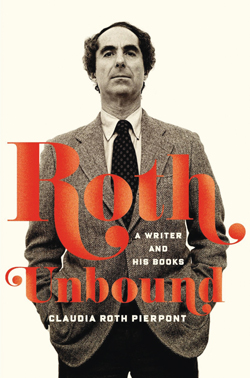Roth Unbound: A Writer and His Books
by Claudia Roth Pierpont
reviewed by Patrick Lohier
Philip Roth has been firmly ensconced in America’s literary pantheon for over fifty years. He has commanded the admiration of readers and writers (Portnoy!), won a litany of prizes and awards, and garnered such extremes of fame and infamy that at eighty he is as much a cultural icon as a literary luminary. In late 2012, the esteemed author startled readers with the announcement of his retirement from writing books.
In her new book, Roth Unbound: A Writer and His Books, New Yorker staff writer Claudia Roth Pierpont gives us an excellent survey of Roth’s life and work. She presents his books as the products of an astonishingly focused and disciplined life. Through nuanced and insightful criticism and biographical portraiture backed by unique access to the author (she is Roth’s friend and one of the few people he has trusted to read his manuscripts before publication), Pierpont demonstrates that Roth’s prolific career has been marked by extraordinary growth and evolution from its start to its end.
Pierpont leverages her long and intimate friendship with Roth with exceptional tact and balance. “Roth has been extremely generous,” she writes in her introduction. “He has answered many, many questions. . . . And he has done all of this with the understanding that he would read not a single word in advance of publication.”
Readers will discover the great rewards of this “understanding.” Roth’s close proximity makes for strange, often thrilling reading. An internationally renowned writer since his thirties, his orbit of friends and acquaintances has included Saul Bellow, John Updike, Milan Kundera, Primo Levi, Bernard Malamud, Harold Pinter, George Plimpton, and the actors Mia Farrow and Ron Silver. With Roth’s help, Pierpont traces the profound influence on Roth of writers both living and dead. And because she has served as one of his readers, she knows firsthand his monkish attentiveness to his writing. His ability to continue writing during a period of illness, she writes, “is evidence both of an unrelenting work ethic, for which he credits his father, and of the fact that writing was the essential condition of his life.”
The book’s title, which echoes Roth’s Zuckerman Unbound, is fitting. Because some of his most memorable characters bear a distinct resemblance to the author, Roth’s books have “bound” readers’ perceptions of the writer to his fictional worlds. It comes as a surprise (although it shouldn’t) to discover what a frustrating burden this has sometimes been for him, especially as a young man, when he secured his fame with the 1969 publication of the onanistic-comedic masterpiece Portnoy’s Complaint. Pierpont extricates Roth from his doubles and doppelgängers, writing, “There is no older or more familiar trap in reading Roth’s work, of course, than to mistake a book’s voice for the author’s autobiographical confession.”
The greatest benefits of Pierpont’s access to Roth, however, are the context and hindsight he provides. Pierpont sets as the book’s starting point the panicked reaction of rabbinical leaders to The New Yorker’s publication of Roth’s short story “Defender of the Faith” in 1959. “It was the depiction of the weaselly, lying nineteen-year-old Jewish soldier that caused the stir.” There began Roth’s active, occasionally combative engagement with readers and critics that over decades has touched not just on religion and identity but on politics, gender and sexuality (he has often been accused of misogyny in his writing), history, violence, and more. That engagement speaks to the power and vitality of Roth’s writing and his unflagging desire to provoke his readers.
Pierpont’s Roth Unbound makes a compelling case for the claim that Roth has been a critical player in the American discourse his entire career. It provides superbly written summaries and critical assessments of each of Roth’s published books; useful, too, is Pierpont’s willingness to share her enthusiasm for her favorites—The Ghost Writer and Sabbath’s Theater—among Roth’s many books.
Near the end of the volume she writes, “If this book were a conventional biography, there would be names and dates; that will come along, in time.” Neither biography nor pure criticism, Roth Unbound is the right book at this particular time: the dusk of Roth’s career. It will be eminently interesting to any reader familiar with Roth’s books, any reader approaching Roth’s work for the first time, and any scholar seeking a survey of Roth’s career or insight into how his life has informed his work.
Published on February 11, 2014

